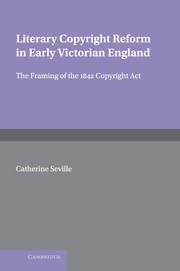Book contents
- Frontmatter
- Contents
- Acknowledgements
- 1 INTRODUCTION
- 2 PETITIONS AND COPYRIGHT
- 3 CRITICS IN PARLIAMENT
- 4 CRITICS IN THE BOOK TRADE I: PRINT WORKERS AND THEIR ALLIES
- 5 CRITICS IN THE BOOK TRADE II: PUBLISHING AND PUBLISHERS
- 6 THE CAMPAIGN IN THE DAILY PRESS
- 7 AUTHORS AND THE BEGINNINGS OF AUTHORS' ORGANISATIONS
- 8 THE MAKING OF THE CASE FOR THE BILL
- 9 CONCLUSION
- Appendix I Chronology of the bills
- Appendix II Successive versions of the bill
- Appendix III The Copyright Act 1842
- Bibliography
- Index
4 - CRITICS IN THE BOOK TRADE I: PRINT WORKERS AND THEIR ALLIES
Published online by Cambridge University Press: 18 July 2009
- Frontmatter
- Contents
- Acknowledgements
- 1 INTRODUCTION
- 2 PETITIONS AND COPYRIGHT
- 3 CRITICS IN PARLIAMENT
- 4 CRITICS IN THE BOOK TRADE I: PRINT WORKERS AND THEIR ALLIES
- 5 CRITICS IN THE BOOK TRADE II: PUBLISHING AND PUBLISHERS
- 6 THE CAMPAIGN IN THE DAILY PRESS
- 7 AUTHORS AND THE BEGINNINGS OF AUTHORS' ORGANISATIONS
- 8 THE MAKING OF THE CASE FOR THE BILL
- 9 CONCLUSION
- Appendix I Chronology of the bills
- Appendix II Successive versions of the bill
- Appendix III The Copyright Act 1842
- Bibliography
- Index
Summary
Early petitions against Talfourd's bill came almost entirely from members of the printing trades, indicating that modifications to copyright were regarded as a threat to trade interests. Yet most, although not all, were presented by radical MPs, suggesting a wider political framework. In order to position the copyright agitation in its correct context, it is necessary to understand the structures which governed these trades in the 1830s, and also the effect that these had on petitioning practice.
Printers were an important group. In relation to the specific issue of copyright, the volume and nature of their petitions was such as to make a real impact. However, it should be remembered that printers no longer enjoyed the state-supported power of the sixteenth and seventeenth centuries. They now worked as paid agents of the publishers, who had come to wield the real economic power in this period. As will be seen in the next chapter, the once feared and revered booksellers of Paternoster Row and the Chapter Coffee House, who had been able to divide up the trade between them, found their gentlemen's agreements ignored by newcomers anxious to exploit the rapidly expanding market for books of all sorts: a new matrix of power was forming.
Nevertheless, the strength and coordination of print trade organisations ensured that they were able to exert considerable and noisy pressure on parliament during the years of copyright debate.
- Type
- Chapter
- Information
- Literary Copyright Reform in Early Victorian EnglandThe Framing of the 1842 Copyright Act, pp. 68 - 99Publisher: Cambridge University PressPrint publication year: 1999



